Leadership in Action: Scientific Management Application Report
VerifiedAdded on 2020/01/15
|7
|1629
|575
Report
AI Summary
This report delves into the application of scientific management principles within a leadership context, using Tesco PLC's sales team as a case study. It begins by introducing scientific management, outlining its core principles as defined by Frederick W. Taylor, and discussing how these principles have been adapted over time. The report then examines the relevance of these principles to the chosen team, analyzing their impact on worker motivation, productivity, and overall organizational performance. It explores the consequences of applying scientific management, including its effects on work practices and knowledge transfer, and assesses the benefits and difficulties of implementing these principles in a contemporary work environment. The report concludes by evaluating the effectiveness and relevance of scientific management in today's organizations, providing insights into its potential for enhancing efficiency and productivity. The analysis is supported by relevant literature, including books and journal articles, to provide a comprehensive understanding of the topic.

Leadership in Action
1
1
Paraphrase This Document
Need a fresh take? Get an instant paraphrase of this document with our AI Paraphraser
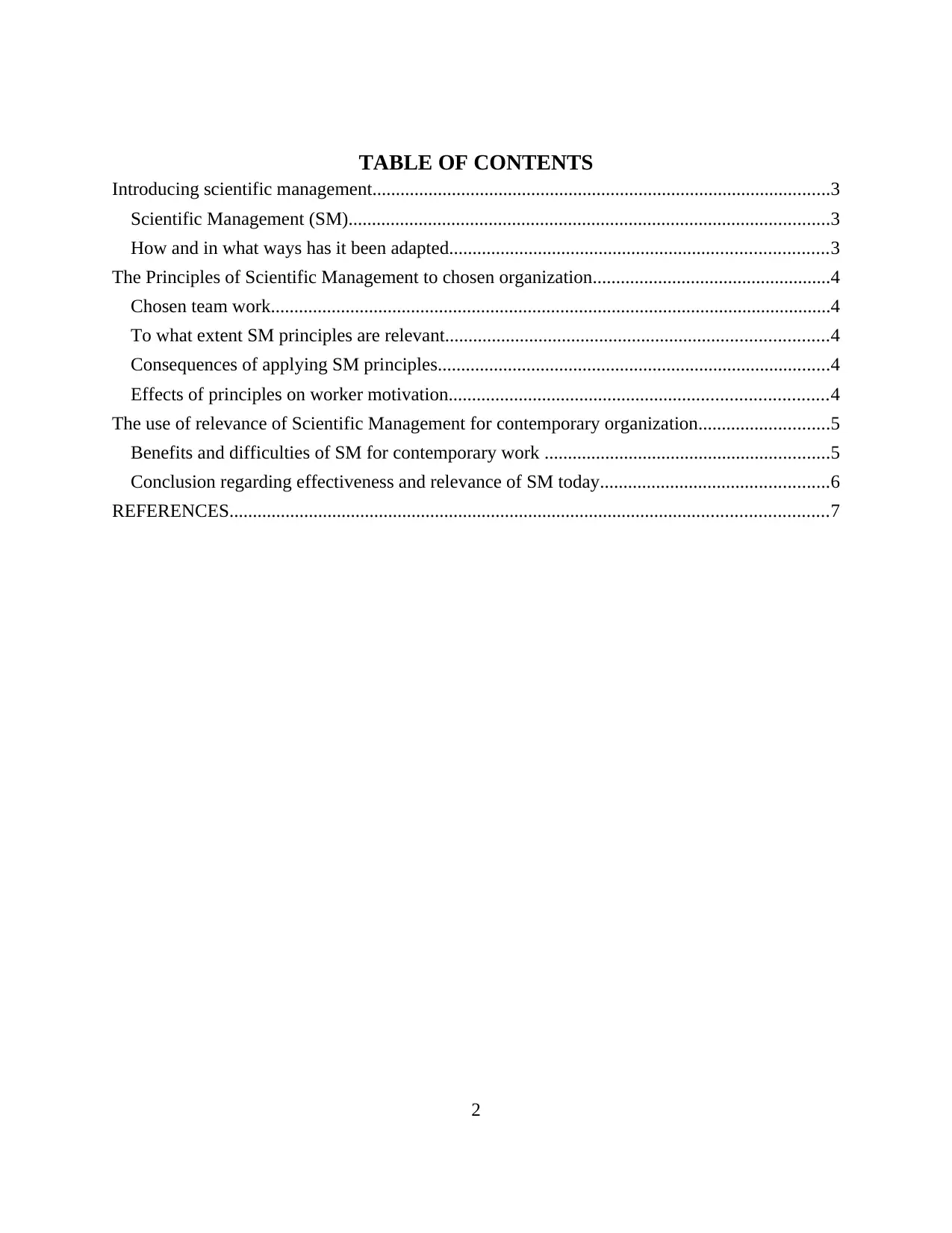
TABLE OF CONTENTS
Introducing scientific management..................................................................................................3
Scientific Management (SM).......................................................................................................3
How and in what ways has it been adapted.................................................................................3
The Principles of Scientific Management to chosen organization...................................................4
Chosen team work........................................................................................................................4
To what extent SM principles are relevant..................................................................................4
Consequences of applying SM principles....................................................................................4
Effects of principles on worker motivation.................................................................................4
The use of relevance of Scientific Management for contemporary organization............................5
Benefits and difficulties of SM for contemporary work .............................................................5
Conclusion regarding effectiveness and relevance of SM today.................................................6
REFERENCES................................................................................................................................7
2
Introducing scientific management..................................................................................................3
Scientific Management (SM).......................................................................................................3
How and in what ways has it been adapted.................................................................................3
The Principles of Scientific Management to chosen organization...................................................4
Chosen team work........................................................................................................................4
To what extent SM principles are relevant..................................................................................4
Consequences of applying SM principles....................................................................................4
Effects of principles on worker motivation.................................................................................4
The use of relevance of Scientific Management for contemporary organization............................5
Benefits and difficulties of SM for contemporary work .............................................................5
Conclusion regarding effectiveness and relevance of SM today.................................................6
REFERENCES................................................................................................................................7
2
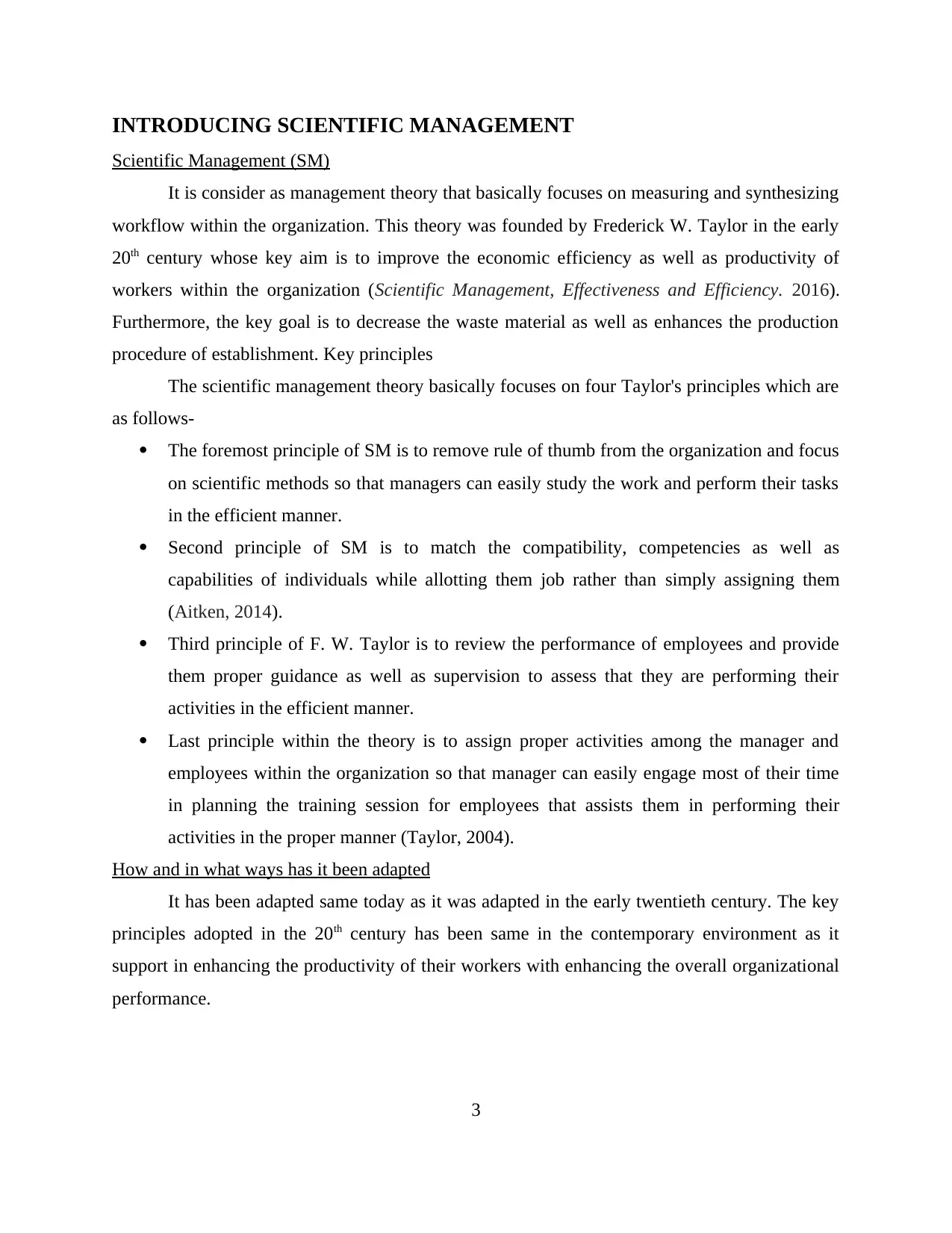
INTRODUCING SCIENTIFIC MANAGEMENT
Scientific Management (SM)
It is consider as management theory that basically focuses on measuring and synthesizing
workflow within the organization. This theory was founded by Frederick W. Taylor in the early
20th century whose key aim is to improve the economic efficiency as well as productivity of
workers within the organization (Scientific Management, Effectiveness and Efficiency. 2016).
Furthermore, the key goal is to decrease the waste material as well as enhances the production
procedure of establishment. Key principles
The scientific management theory basically focuses on four Taylor's principles which are
as follows-
The foremost principle of SM is to remove rule of thumb from the organization and focus
on scientific methods so that managers can easily study the work and perform their tasks
in the efficient manner.
Second principle of SM is to match the compatibility, competencies as well as
capabilities of individuals while allotting them job rather than simply assigning them
(Aitken, 2014).
Third principle of F. W. Taylor is to review the performance of employees and provide
them proper guidance as well as supervision to assess that they are performing their
activities in the efficient manner.
Last principle within the theory is to assign proper activities among the manager and
employees within the organization so that manager can easily engage most of their time
in planning the training session for employees that assists them in performing their
activities in the proper manner (Taylor, 2004).
How and in what ways has it been adapted
It has been adapted same today as it was adapted in the early twentieth century. The key
principles adopted in the 20th century has been same in the contemporary environment as it
support in enhancing the productivity of their workers with enhancing the overall organizational
performance.
3
Scientific Management (SM)
It is consider as management theory that basically focuses on measuring and synthesizing
workflow within the organization. This theory was founded by Frederick W. Taylor in the early
20th century whose key aim is to improve the economic efficiency as well as productivity of
workers within the organization (Scientific Management, Effectiveness and Efficiency. 2016).
Furthermore, the key goal is to decrease the waste material as well as enhances the production
procedure of establishment. Key principles
The scientific management theory basically focuses on four Taylor's principles which are
as follows-
The foremost principle of SM is to remove rule of thumb from the organization and focus
on scientific methods so that managers can easily study the work and perform their tasks
in the efficient manner.
Second principle of SM is to match the compatibility, competencies as well as
capabilities of individuals while allotting them job rather than simply assigning them
(Aitken, 2014).
Third principle of F. W. Taylor is to review the performance of employees and provide
them proper guidance as well as supervision to assess that they are performing their
activities in the efficient manner.
Last principle within the theory is to assign proper activities among the manager and
employees within the organization so that manager can easily engage most of their time
in planning the training session for employees that assists them in performing their
activities in the proper manner (Taylor, 2004).
How and in what ways has it been adapted
It has been adapted same today as it was adapted in the early twentieth century. The key
principles adopted in the 20th century has been same in the contemporary environment as it
support in enhancing the productivity of their workers with enhancing the overall organizational
performance.
3
⊘ This is a preview!⊘
Do you want full access?
Subscribe today to unlock all pages.

Trusted by 1+ million students worldwide
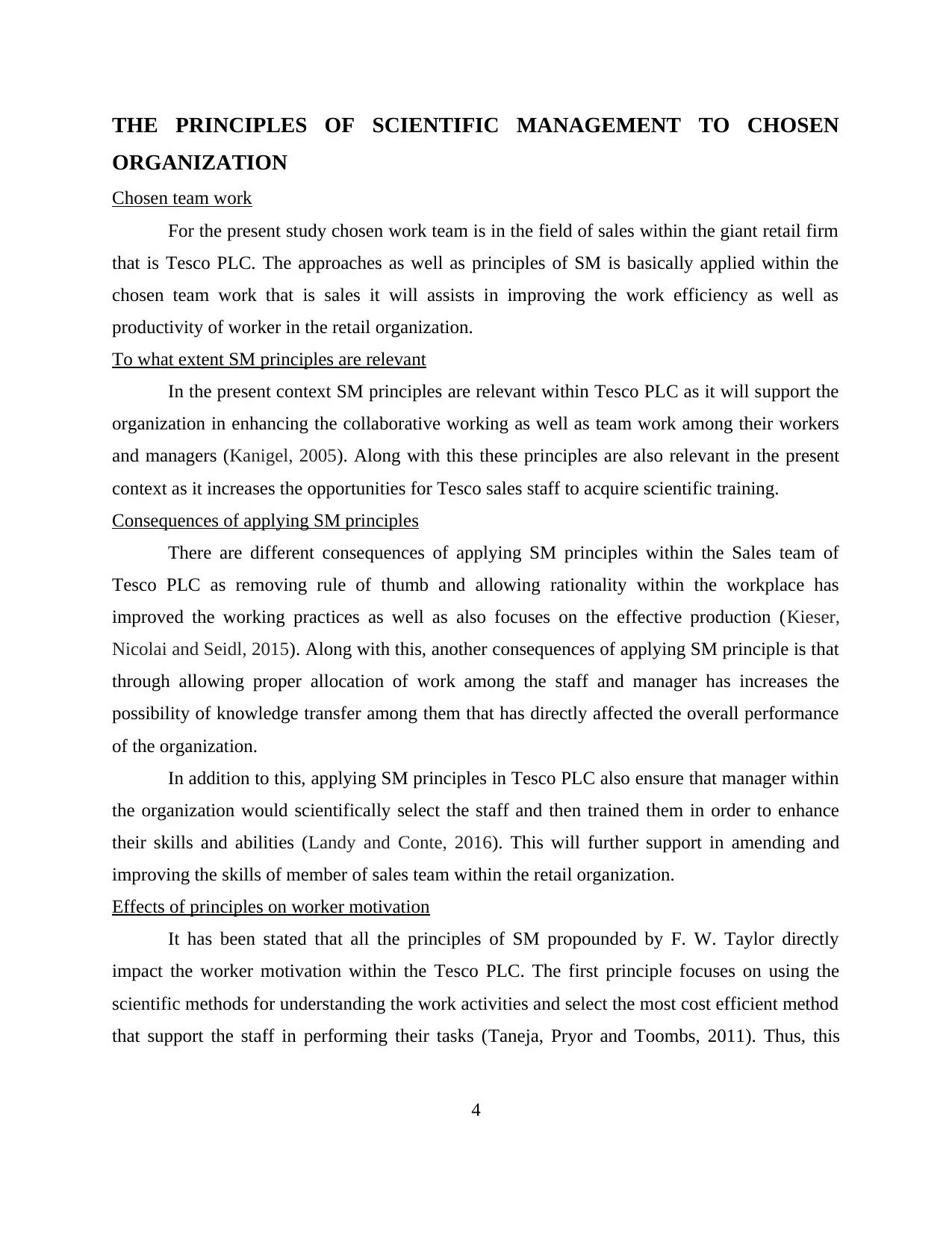
THE PRINCIPLES OF SCIENTIFIC MANAGEMENT TO CHOSEN
ORGANIZATION
Chosen team work
For the present study chosen work team is in the field of sales within the giant retail firm
that is Tesco PLC. The approaches as well as principles of SM is basically applied within the
chosen team work that is sales it will assists in improving the work efficiency as well as
productivity of worker in the retail organization.
To what extent SM principles are relevant
In the present context SM principles are relevant within Tesco PLC as it will support the
organization in enhancing the collaborative working as well as team work among their workers
and managers (Kanigel, 2005). Along with this these principles are also relevant in the present
context as it increases the opportunities for Tesco sales staff to acquire scientific training.
Consequences of applying SM principles
There are different consequences of applying SM principles within the Sales team of
Tesco PLC as removing rule of thumb and allowing rationality within the workplace has
improved the working practices as well as also focuses on the effective production (Kieser,
Nicolai and Seidl, 2015). Along with this, another consequences of applying SM principle is that
through allowing proper allocation of work among the staff and manager has increases the
possibility of knowledge transfer among them that has directly affected the overall performance
of the organization.
In addition to this, applying SM principles in Tesco PLC also ensure that manager within
the organization would scientifically select the staff and then trained them in order to enhance
their skills and abilities (Landy and Conte, 2016). This will further support in amending and
improving the skills of member of sales team within the retail organization.
Effects of principles on worker motivation
It has been stated that all the principles of SM propounded by F. W. Taylor directly
impact the worker motivation within the Tesco PLC. The first principle focuses on using the
scientific methods for understanding the work activities and select the most cost efficient method
that support the staff in performing their tasks (Taneja, Pryor and Toombs, 2011). Thus, this
4
ORGANIZATION
Chosen team work
For the present study chosen work team is in the field of sales within the giant retail firm
that is Tesco PLC. The approaches as well as principles of SM is basically applied within the
chosen team work that is sales it will assists in improving the work efficiency as well as
productivity of worker in the retail organization.
To what extent SM principles are relevant
In the present context SM principles are relevant within Tesco PLC as it will support the
organization in enhancing the collaborative working as well as team work among their workers
and managers (Kanigel, 2005). Along with this these principles are also relevant in the present
context as it increases the opportunities for Tesco sales staff to acquire scientific training.
Consequences of applying SM principles
There are different consequences of applying SM principles within the Sales team of
Tesco PLC as removing rule of thumb and allowing rationality within the workplace has
improved the working practices as well as also focuses on the effective production (Kieser,
Nicolai and Seidl, 2015). Along with this, another consequences of applying SM principle is that
through allowing proper allocation of work among the staff and manager has increases the
possibility of knowledge transfer among them that has directly affected the overall performance
of the organization.
In addition to this, applying SM principles in Tesco PLC also ensure that manager within
the organization would scientifically select the staff and then trained them in order to enhance
their skills and abilities (Landy and Conte, 2016). This will further support in amending and
improving the skills of member of sales team within the retail organization.
Effects of principles on worker motivation
It has been stated that all the principles of SM propounded by F. W. Taylor directly
impact the worker motivation within the Tesco PLC. The first principle focuses on using the
scientific methods for understanding the work activities and select the most cost efficient method
that support the staff in performing their tasks (Taneja, Pryor and Toombs, 2011). Thus, this
4
Paraphrase This Document
Need a fresh take? Get an instant paraphrase of this document with our AI Paraphraser
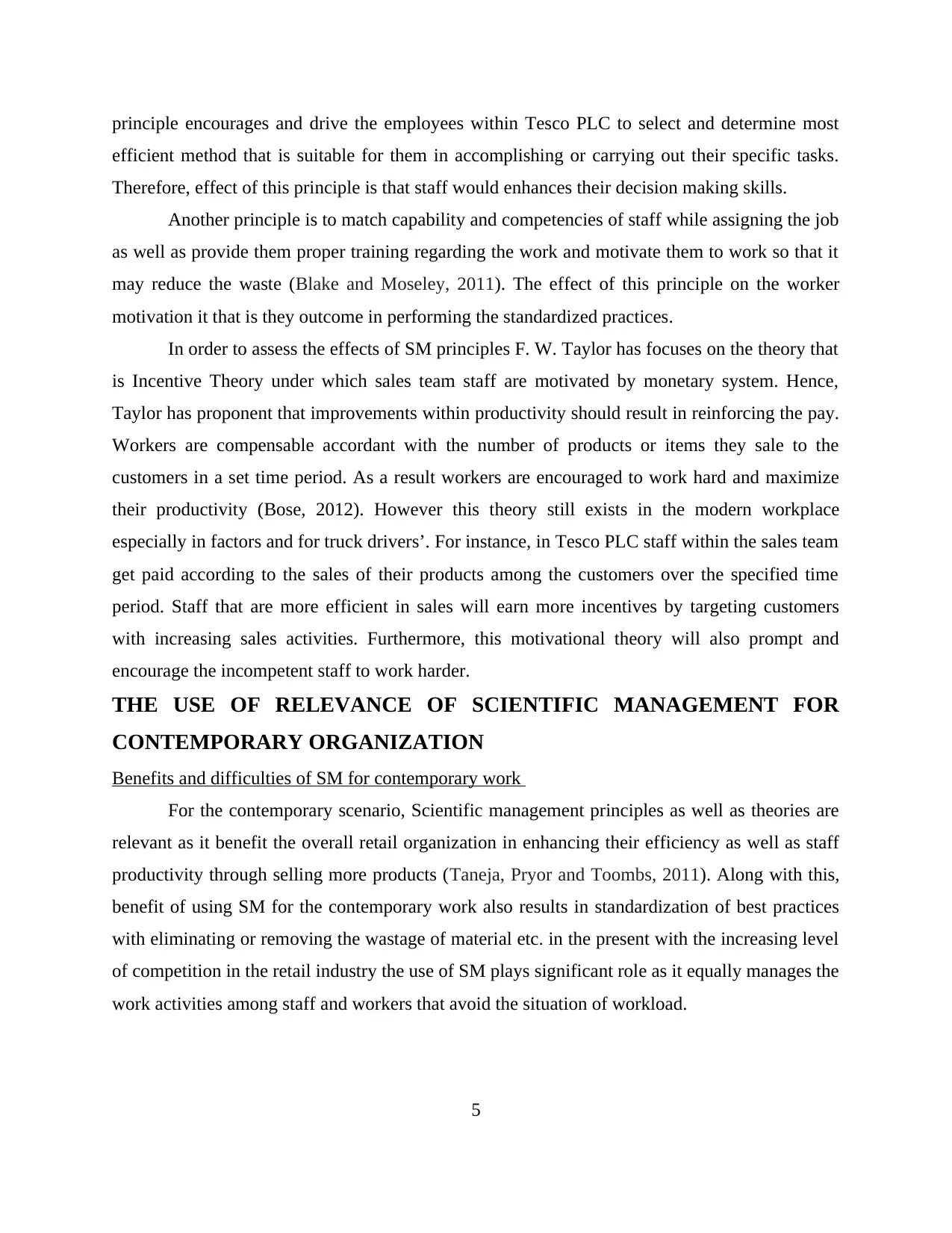
principle encourages and drive the employees within Tesco PLC to select and determine most
efficient method that is suitable for them in accomplishing or carrying out their specific tasks.
Therefore, effect of this principle is that staff would enhances their decision making skills.
Another principle is to match capability and competencies of staff while assigning the job
as well as provide them proper training regarding the work and motivate them to work so that it
may reduce the waste (Blake and Moseley, 2011). The effect of this principle on the worker
motivation it that is they outcome in performing the standardized practices.
In order to assess the effects of SM principles F. W. Taylor has focuses on the theory that
is Incentive Theory under which sales team staff are motivated by monetary system. Hence,
Taylor has proponent that improvements within productivity should result in reinforcing the pay.
Workers are compensable accordant with the number of products or items they sale to the
customers in a set time period. As a result workers are encouraged to work hard and maximize
their productivity (Bose, 2012). However this theory still exists in the modern workplace
especially in factors and for truck drivers’. For instance, in Tesco PLC staff within the sales team
get paid according to the sales of their products among the customers over the specified time
period. Staff that are more efficient in sales will earn more incentives by targeting customers
with increasing sales activities. Furthermore, this motivational theory will also prompt and
encourage the incompetent staff to work harder.
THE USE OF RELEVANCE OF SCIENTIFIC MANAGEMENT FOR
CONTEMPORARY ORGANIZATION
Benefits and difficulties of SM for contemporary work
For the contemporary scenario, Scientific management principles as well as theories are
relevant as it benefit the overall retail organization in enhancing their efficiency as well as staff
productivity through selling more products (Taneja, Pryor and Toombs, 2011). Along with this,
benefit of using SM for the contemporary work also results in standardization of best practices
with eliminating or removing the wastage of material etc. in the present with the increasing level
of competition in the retail industry the use of SM plays significant role as it equally manages the
work activities among staff and workers that avoid the situation of workload.
5
efficient method that is suitable for them in accomplishing or carrying out their specific tasks.
Therefore, effect of this principle is that staff would enhances their decision making skills.
Another principle is to match capability and competencies of staff while assigning the job
as well as provide them proper training regarding the work and motivate them to work so that it
may reduce the waste (Blake and Moseley, 2011). The effect of this principle on the worker
motivation it that is they outcome in performing the standardized practices.
In order to assess the effects of SM principles F. W. Taylor has focuses on the theory that
is Incentive Theory under which sales team staff are motivated by monetary system. Hence,
Taylor has proponent that improvements within productivity should result in reinforcing the pay.
Workers are compensable accordant with the number of products or items they sale to the
customers in a set time period. As a result workers are encouraged to work hard and maximize
their productivity (Bose, 2012). However this theory still exists in the modern workplace
especially in factors and for truck drivers’. For instance, in Tesco PLC staff within the sales team
get paid according to the sales of their products among the customers over the specified time
period. Staff that are more efficient in sales will earn more incentives by targeting customers
with increasing sales activities. Furthermore, this motivational theory will also prompt and
encourage the incompetent staff to work harder.
THE USE OF RELEVANCE OF SCIENTIFIC MANAGEMENT FOR
CONTEMPORARY ORGANIZATION
Benefits and difficulties of SM for contemporary work
For the contemporary scenario, Scientific management principles as well as theories are
relevant as it benefit the overall retail organization in enhancing their efficiency as well as staff
productivity through selling more products (Taneja, Pryor and Toombs, 2011). Along with this,
benefit of using SM for the contemporary work also results in standardization of best practices
with eliminating or removing the wastage of material etc. in the present with the increasing level
of competition in the retail industry the use of SM plays significant role as it equally manages the
work activities among staff and workers that avoid the situation of workload.
5
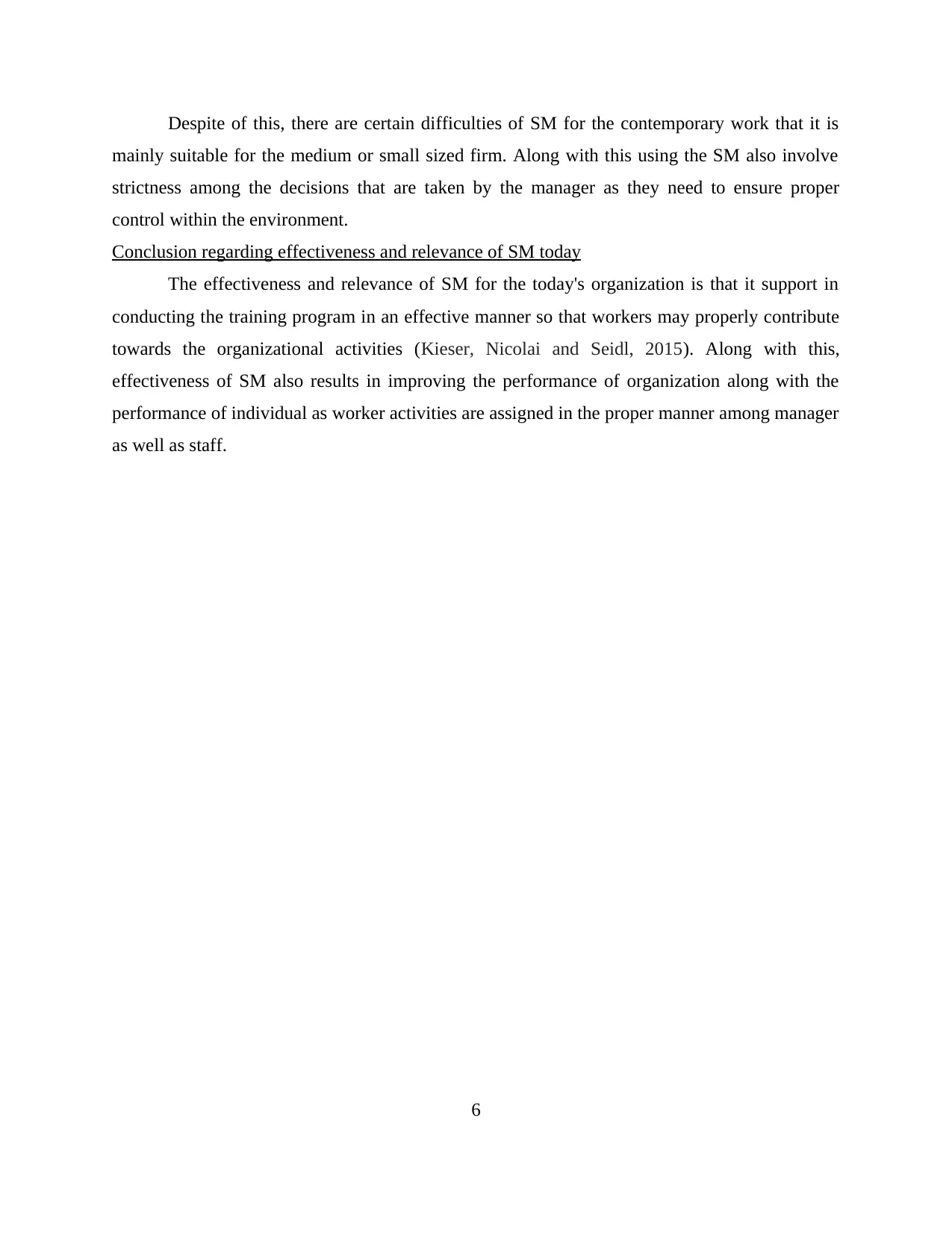
Despite of this, there are certain difficulties of SM for the contemporary work that it is
mainly suitable for the medium or small sized firm. Along with this using the SM also involve
strictness among the decisions that are taken by the manager as they need to ensure proper
control within the environment.
Conclusion regarding effectiveness and relevance of SM today
The effectiveness and relevance of SM for the today's organization is that it support in
conducting the training program in an effective manner so that workers may properly contribute
towards the organizational activities (Kieser, Nicolai and Seidl, 2015). Along with this,
effectiveness of SM also results in improving the performance of organization along with the
performance of individual as worker activities are assigned in the proper manner among manager
as well as staff.
6
mainly suitable for the medium or small sized firm. Along with this using the SM also involve
strictness among the decisions that are taken by the manager as they need to ensure proper
control within the environment.
Conclusion regarding effectiveness and relevance of SM today
The effectiveness and relevance of SM for the today's organization is that it support in
conducting the training program in an effective manner so that workers may properly contribute
towards the organizational activities (Kieser, Nicolai and Seidl, 2015). Along with this,
effectiveness of SM also results in improving the performance of organization along with the
performance of individual as worker activities are assigned in the proper manner among manager
as well as staff.
6
⊘ This is a preview!⊘
Do you want full access?
Subscribe today to unlock all pages.

Trusted by 1+ million students worldwide
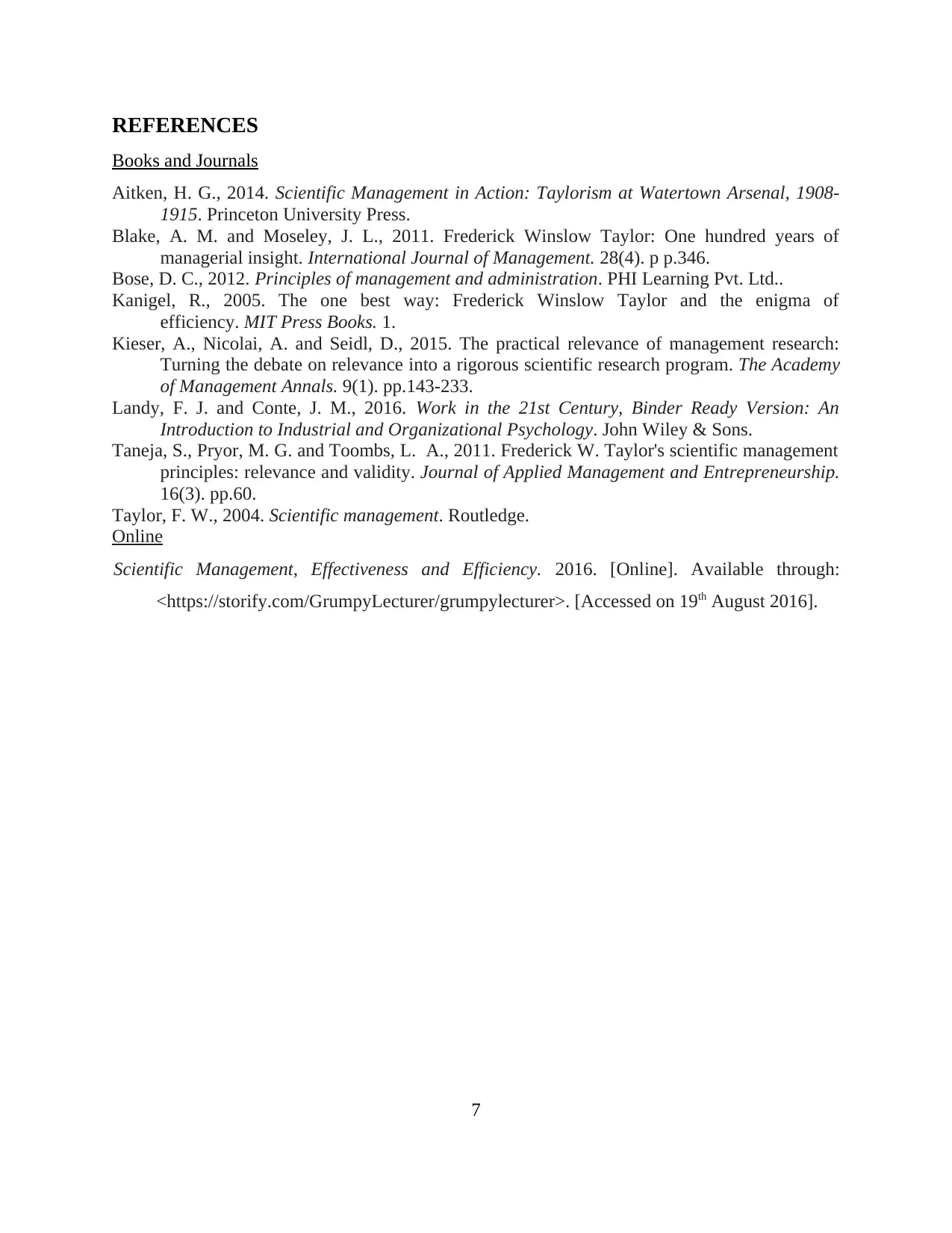
REFERENCES
Books and Journals
Aitken, H. G., 2014. Scientific Management in Action: Taylorism at Watertown Arsenal, 1908-
1915. Princeton University Press.
Blake, A. M. and Moseley, J. L., 2011. Frederick Winslow Taylor: One hundred years of
managerial insight. International Journal of Management. 28(4). p p.346.
Bose, D. C., 2012. Principles of management and administration. PHI Learning Pvt. Ltd..
Kanigel, R., 2005. The one best way: Frederick Winslow Taylor and the enigma of
efficiency. MIT Press Books. 1.
Kieser, A., Nicolai, A. and Seidl, D., 2015. The practical relevance of management research:
Turning the debate on relevance into a rigorous scientific research program. The Academy
of Management Annals. 9(1). pp.143-233.
Landy, F. J. and Conte, J. M., 2016. Work in the 21st Century, Binder Ready Version: An
Introduction to Industrial and Organizational Psychology. John Wiley & Sons.
Taneja, S., Pryor, M. G. and Toombs, L. A., 2011. Frederick W. Taylor's scientific management
principles: relevance and validity. Journal of Applied Management and Entrepreneurship.
16(3). pp.60.
Taylor, F. W., 2004. Scientific management. Routledge.
Online
Scientific Management, Effectiveness and Efficiency. 2016. [Online]. Available through:
<https://storify.com/GrumpyLecturer/grumpylecturer>. [Accessed on 19th August 2016].
7
Books and Journals
Aitken, H. G., 2014. Scientific Management in Action: Taylorism at Watertown Arsenal, 1908-
1915. Princeton University Press.
Blake, A. M. and Moseley, J. L., 2011. Frederick Winslow Taylor: One hundred years of
managerial insight. International Journal of Management. 28(4). p p.346.
Bose, D. C., 2012. Principles of management and administration. PHI Learning Pvt. Ltd..
Kanigel, R., 2005. The one best way: Frederick Winslow Taylor and the enigma of
efficiency. MIT Press Books. 1.
Kieser, A., Nicolai, A. and Seidl, D., 2015. The practical relevance of management research:
Turning the debate on relevance into a rigorous scientific research program. The Academy
of Management Annals. 9(1). pp.143-233.
Landy, F. J. and Conte, J. M., 2016. Work in the 21st Century, Binder Ready Version: An
Introduction to Industrial and Organizational Psychology. John Wiley & Sons.
Taneja, S., Pryor, M. G. and Toombs, L. A., 2011. Frederick W. Taylor's scientific management
principles: relevance and validity. Journal of Applied Management and Entrepreneurship.
16(3). pp.60.
Taylor, F. W., 2004. Scientific management. Routledge.
Online
Scientific Management, Effectiveness and Efficiency. 2016. [Online]. Available through:
<https://storify.com/GrumpyLecturer/grumpylecturer>. [Accessed on 19th August 2016].
7
1 out of 7
Related Documents
Your All-in-One AI-Powered Toolkit for Academic Success.
+13062052269
info@desklib.com
Available 24*7 on WhatsApp / Email
![[object Object]](/_next/static/media/star-bottom.7253800d.svg)
Unlock your academic potential
Copyright © 2020–2026 A2Z Services. All Rights Reserved. Developed and managed by ZUCOL.




